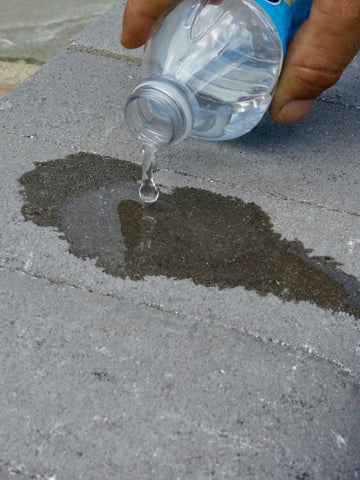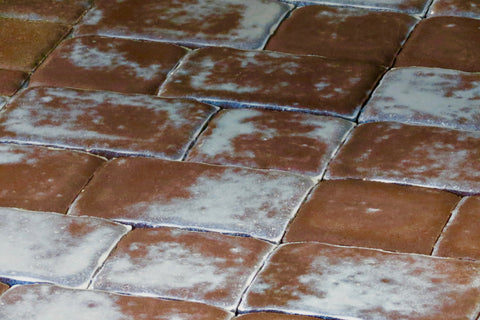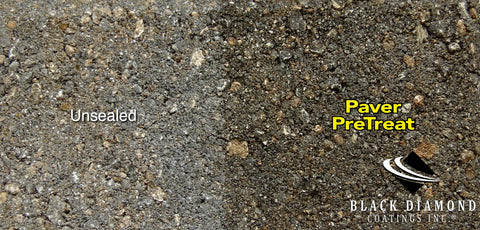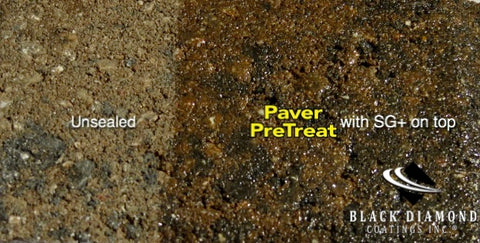Anyone that has been in the paver sealing industry for any length of time can tell you the old ways of sealing pavers have come to an end. In years past, you could approach almost every sealer job the exact same way. You pressure clean the pavers, re-sand the paver joints and then apply two coats of your favorite paver sealer and the job was complete. You move on to the next job and repeat the exact same process.
The paver manufacturing process has evolved over the years only to leave the old tried and true way of sealing pavers obsolete. The pavers being installed today are either more porous than in years past, or they are extremely dense, forcing the sealer contractors and DIYers to change as well. No other sealer company has recognized this issue, and they continue to recommend sealing the same way as in years past which only leads to frustration.
With the rising demand for hardscape installations, the demand for sealing all these paver installations is on the rise as well. Concrete pavers across the country can be quite different depending on the materials that are used. Interlocking paver manufacturers offer a multitude of different colors and paver styles at varying price points.
Saying all pavers are the same is like saying that all sealers are created equal, which is far from true.
Paver Quality Standards
The standards for the manufacturing of concrete interlocking pavers are set forth in the ASTM C936 (American Society for Testing and Materials). This standard applies to regular “thick” pavers, not the thin pavers that are used as an overlay on pool decks, patios and walkways. Owners, specifiers and contractors, alike, should insist on pavers that meet these standards, with the understanding that often, quality may go hand-in-hand with a higher cost
ICPI (Interlocking Concrete Pavement Institute) is the trade association representing the manufacturers and installers of concrete pavers in the United States and Canada. Robert Bowers, P. Eng., Director of Engineering for ICPI, recommends that concrete pavers used in the United States should be manufactured to meet or exceed the criteria defined in ASTM C936 Standard Specification for Solid Concrete Interlocking Paving Units. This standard specifies several requirements including:
- At the time of delivery to the work site, the average compressive strength of the tested paver shall be 8000 psi or greater.
- The average absorption of the tested pavers shall be 5 % or less.
Ensure you are thoroughly informed about the quality of pavers that you are purchasing. Some of the potential issues that may result from having pavers installed that do not meet these requirements are:
- Premature degradation
- Increased mold/mildew
- Premature color loss
- Cracking/chipping
This coping is more porous and absorbs the water within seconds.
The Challenge of Sealing Porous Pavers
 Sealer contractors today are quickly learning that “all pavers are not created equal.” Historically, a sealer contractor could approach a seal job with a 90% chance that the pavers would require two coats of a film-forming sealer to be properly sealed. The first coat would soak into the paver, and the second coat would remain on the surface of the paver delivering the desired level of sheen. Applying two coats of sealer to a porous paver may look good for a short period of time but the paver will continue to absorb the sealer and within a short time will leave the paver looking dull and often appears to be unsealed.
Sealer contractors today are quickly learning that “all pavers are not created equal.” Historically, a sealer contractor could approach a seal job with a 90% chance that the pavers would require two coats of a film-forming sealer to be properly sealed. The first coat would soak into the paver, and the second coat would remain on the surface of the paver delivering the desired level of sheen. Applying two coats of sealer to a porous paver may look good for a short period of time but the paver will continue to absorb the sealer and within a short time will leave the paver looking dull and often appears to be unsealed.
Today, successful sealer contractors must vary their sealer usage and techniques to account for more differences in paver porosity. Concrete pavers have pores that are filled up with sealer. Penetrating sealers fill the pores without forming a film. Some sealers are designed to fill the pores and then form a film on the surface (i.e., film-forming sealers).
A good porosity field test is to pour some water on the paver. If the water soaks into the paver immediately, you are dealing with a very porous surface and should treat it accordingly when applying a sealer. If the water remains on the surface for more than 30 seconds, the pavers are less porous and should be sealed accordingly.
Sealing these pavers can become quite challenging and frustrating for most contractors, not to mention costly with the addition of more sealer that was originally estimated.
The Sealing Solution for More Porous Pavers
When color-enhancement is desired (e.g., the “wet look”), which is typically generated with film-forming sealers, there is a cost-effective solution. We have listened to both contractors and DIYers and have created a game-changing, new product to help save both time and money.
One application of our new Paver PreTreat with advanced nanotechnology will close off the pores in the paver and will typically require only one coat of SG+, LG+ or NG+ as a top coat. This revolutionary new product is the only color-enhancing, paver densifier/base-coat on the market today. The product eliminates the need for multiple coats of sealer required to properly seal porous pavers. Whether you are a paver sealer contractor struggling with these issues or a DIY PRO, the use of our new Paver PreTreat will save you both time and money, which is a win-win.
This approach will significantly reduce the overall amount of sealer that is needed to properly seal the paver. In addition, it will reduce the total amount of time on the jobsite by not having to apply multiple coats of sealer to the paver.
Some pavers have different porosity within the paver itself, which requires the applicator to pay attention and vary their spraying and back-rolling techniques.

PAVER WITH THE COLOR-ENHANCING BASE COAT OF PAVER PRETREAT APPLIED.

PAVER SEALED WITH PAVER PRETREAT AS THE BASE COAT, AND ONE COAT OF SG+ ON TOP.
The Challenge of Sealing Dense Pavers
Just as there are challenges sealing porous pavers, the same is true for sealing very dense pavers. Often pavers manufactured for commercial applications, manufactured stone and most wetcast pavers are very dense and should be approached with a similar sealing method for sealing natural stone.
Even those these types of pavers are cementitious, they will not withstand the same sealing applications of their “regular” paver cousins. Sealing dense pavers using the same high-solids sealer and application methods as a regular interlocking paver will cause adverse issues such as excess sealer on the surface (may increase the slip co-efficiency of the surface), while also increasing the likelihood of adherence issues.
The Sealing Solution for Dense Pavers
Just as a very dense paver will not absorb much moisture, the same is true when applying sealer. One major factor to consider when sealing a dense paver is making sure that you choose the appropriate sealer to match the surface being sealed. For many sealers, the key to successfully sealing very dense pavers is remembering “less is more.”
Treat the surface as though it was a natural stone sealing job, whether it’s using a stone sealer or one coat of a traditional concrete film forming sealer, or using the stone sealing techniques and application methods. Ask your sealer manufacturer what to use and how to apply.
Conclusion
The days of approaching every seal job with the same product and application methods are over. The paver landscape is evolving and so must those of us sealing pavers. Make sure you consider the porosity of the pavers you are sealing and it will make your job much easier, less expensive and you will have a beautifully sealed paver surface for years to come.
To learn more, visit www.BlackDiamondCoatings.com, or call at 800-270-4050.
